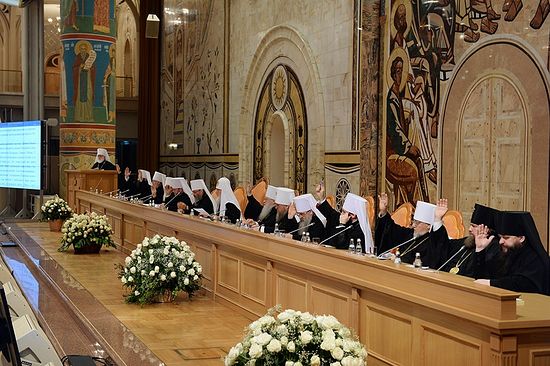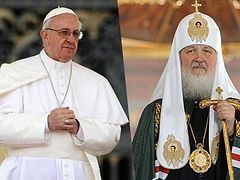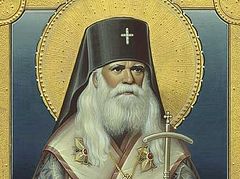The Council of Bishops which was held in Moscow on February 2-3, 2016, addressed the clergy, monastics and all the faithful members of the Russian Orthodox Church.
Dear in Christ reverent Fathers, God-loving monks and nuns, beloved brothers and sisters!
The Council of Hierarchs that was held in the city of Moscow on February 2-3 addresses you with the apostolic words: May “grace, mercy, and peace, from God our Father and Jesus Christ our Lord” (1 Tim. 1:2) ever be with you.
The words of the Lord, “that they all may be one” (Jn 17:21), are of a special significance for us today, when there are more and more divisions in the world. As Apostle Paul says: “Now I beseech you, brethren, by the name of our Lord Jesus Christ, that ye all speak the same thing, and that there be no divisions among you; but that ye be perfectly joined together in the same mind and in the same judgment” (1 Cor. 1:10). The concern for the maintenance of Church unity is the obligation of every Orthodox Christian: bishop, clergy, monk and layperson.
Church Councils were Among the means of expressing of this unity – beginning from the very first Council held by the apostles in Jerusalem, whose decisions were preceded by the words: “For it seemed good to the Holy Ghost, and to us” (Acts 15:28). At the present time a Pan-Orthodox Council is being prepared in which bishops of all the generally recognized Local Orthodox Churches will take part. The Council is scheduled to be opened on the day of Holy Pentecost this year on Crete, Greece. The hierarchs who will represent the Russian Orthodox Church at the Pan-Orthodox Council are to give answers to the questions confronting the fullness of Orthodoxy, together with representatives of other Local Churches, rigorously following the truth of Christ and being guided by the tradition of the Holy Fathers that has been kept by the Church for over 1000 years. We are asking you to offer up fervent prayers so that the Lord might reveal His holy will to the members of the forthcoming Holy and Great Council of the Orthodox Church, and that it might serve for the glory of God, for the good of the family of world Orthodoxy, for the strengthening of its unity, and for the preservation of purity of our most holy faith (see also Jude 1:20).
The inseparable link between the Church in heaven and the Church on the earth is once again revealed in the canonization at the present Council of Archbishop Seraphim (Sobolev; 1881-1950) of Boguchar, who carried out his archpastoral ministry in Bulgaria where he ended his days. This saint of God showed an example of righteous life, ardent and sincere love for his flock; and already in his lifetime the Lord glorified him with gifts of grace, and after his blessed repose, by miracles. The words of the hierarch about the need to adhere firmly to the Orthodox faith ring out convincingly, strongly and clearly: “The essential aspect of the Church,” writes Archbishop Seraphim, “is in the unchangingness of Her dogmatic, moral and canonical teaching, which comes from God Himself, our Lord Jesus Christ...Her principal and essential distinctiveness from all other Christian denominations consists precisely in this unchanging teaching of the Orthodox Church, in that she has preserved the apostolic faith in total purity.” The Russian Orthodox Church is guided and will be guided by such an understanding.
Rejoicing at the increasing veneration of the blessed saints of God among the faithful people, the Council has blessed the Church-wide veneration of a whole host of saints who earlier were only locally venerated, including the Passion-Bearer and Doctor Eugene (Evgeny) Botkin, who was martyred together with the Royal Family. His Church-wide canonization has a particular meaning today, when the Russian Church wants a full examination of circumstances of the Holy Royal Family’s martyrdom.
At the present time there is a new stage of the examination of the remains discovered in Yekaterinburg and are attributed to the Royal Family. The Council of Bishops insists on impartiality and a thorough scientific nature of the examination, because the Church regards the remains of the passion-bearers as holy relics. The remains discovered in Yekaterinburg can be recognized as holy relics, provided there is absolutely no doubt about their authenticity.
The Russian Orthodox Church is praying for peace in the long-suffering Ukrainian land, where the armed conflict in the southeast is going on. Given the takeover of churches and persecution of faithful children of the canonical Church, the Council is calling all to increase prayer for the bishops, clergy, monastics and laity of the Ukrainian Orthodox Church.
Another subject of our deep concern is the ongoing violence towards the population of the Middle East and persecution of the Christians of the region, who are being tortured and driven away from their places of residence. Churches are being destroyed, and shrines are being vandalized. Today we are praying for the peaceful settlement of the military conflicts in this region.
The Orthodox Church carries out its saving ministry unfailingly, announcing the good tidings of Christ—crucified and resurrected—to those near and far. All of us are called to witness by our word and life: archpastors, clergy, monastics and laity. May the God of peace, Who raised up the Shepherd of the sheep from the dead, great through the Blood of the eternal covenant, our Lord Jesus Christ, perfect us in every good deed, in fulfilling His will, bringing forth in us that which is good and pleasing to Him through Jesus Christ (cf. Heb. 13, 20).
Amen.
Source: Patriarchia.ru




